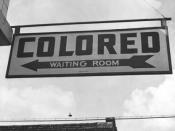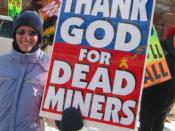"Hate" speech refers to any expression that conveys derogatory views about groups or individuals identified by such characteristics as sex, race, ethnicity, gender, religious beliefs, and sexual preference. This type of speech poses a conflict between two important values, freedom and parity. Most people may be reluctant in this situation to concur with the side of free expression; some may even argue it's immoral. However, the law opposes any legal limitations on, or control of, hate speech, and the reasons for extending legal protection to it are very strong.
First of all, there is the simplistic defense that although hate speech may communicate offensive and depreciating views, simply because it communicates a point of view it is level with any other point of view covered by freedom of speech. Therefore, it can be limited no more than any other view that is disliked by someone solely because their opinion differs.
Basically, saying 'all blacks are inferior' is no different than saying 'all country music is inferior'. Additionally, it would be hypocritical to allow freedom of expression and then turn around and regulate or limit what can be freely expressed. Consequently, to be completely free it is necessary to allow any expression, however immoral or degrading it may seem.
Furthermore, the unpopularity of hate speech is irrelevant to its protection. Imagine in today's society someone imparts an unconventional, yet true, idea parallel to the fact that the Earth is round. If freedom of expression is restricted based on the content's popularity this idea's importance would never be comprehended and its use would be lost. Giving relevance to popularity forces conformity and can have grand negative repercussions.
One might raise the objection that in the above example the person's idea was true but that most opinions expressed in...


